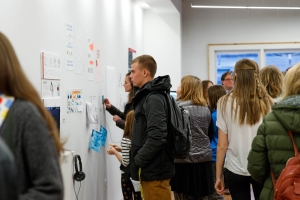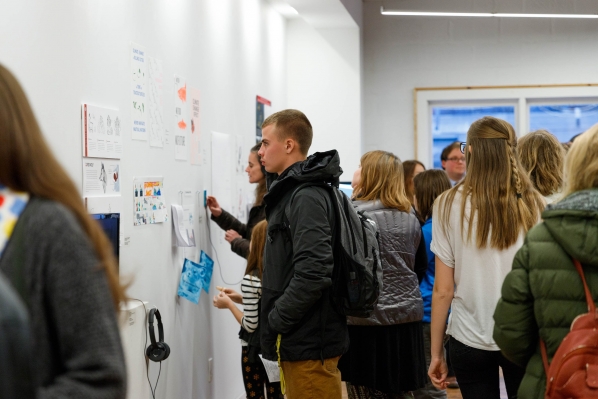Sustainability has long been a core value shared by faculty, staff and students at Appalachian State University. In the Goodnight Family Department of Sustainable Development, sustainability initiatives — and climate change specifically — are often at the forefront of class discussions, research and more. In May 2017, a small group of faculty led by Senior Lecturer Laura England created the Climate Stories Collaborative to advance the university’s conversation on the topic.
The collaborative is a faculty-led initiative aimed at growing the capacity of faculty and students to use a variety of creative media to tell the stories of those who are already affected by, and/or taking action to address, climate change.
England, who has taught in Appalachian’s Sustainable Development Department for nine years, was inspired by a conference session she attended in October of 2016 led by Jeff Biggers, a “celebrated playwright, author, historian and leader” who leads the Climate Narratives Project at the University of Iowa.
England and colleagues invited Biggers to campus to lead a faculty workshop, class visit sessions and a community event in spring 2017.
“His visit focused on the role of creative expression in elevating and growing the climate conversation, generated a lot of energy and sparked interest among a group of faculty, especially in the College of Fine and Applied Arts,” England said about her inspiration for the program.
The collaborative is now led by a trio of facilitators — England, Derek Davidson, assistant professor in the Department of Theatre and Dance and Jennie Carlisle, director of the Smith Gallery and lecturer in the Department of Art. Over the last 18 months, the collaborative has grown to engage more than 70 faculty from 23 departments and a couple thousand students across the university.
“In addition to being moved by climate stories, students are also growing their capacity to express climate stories in creative and compelling ways,” England explained. “It's incredibly rewarding to witness students confronting the most challenging issue of our time with compassion and creativity, meanwhile growing their commitment to contributing to climate action.”Stories, broadly defined by the collaborative to include all forms of creative expression, “evoke empathy, help close perceived gaps that are barriers to action, empower us with a sense of agency and help us imagine different possible futures,” said England. “The collaborative is our response to calls from communication scholars for a paradigm shift in climate communication.”
This semester, the collaborative will host an Artist Talk + Meet and Greet on April 2 by Mel Chin and the Climate Stories Showcase exhibition at HOW Space April 5-10. To learn more about the collaborative and additional events this spring, visit faa.appstate.edu/events/climate-stories-collaborative.
By Caroline Lubinsky
About the Goodnight Family Department of Sustainable Development
One of seven departments housed in the College of Fine and Applied Arts, the Goodnight Family Department of Sustainable Development at Appalachian State University prepares students to thoughtfully analyze human development while focusing on the applied practice of pursuing transformative, community-driven development and social change. It offers a Bachelor of Science degree in sustainable development with concentrations in agroecology and sustainable agriculture; community, regional and global development; and environmental studies; as well as a Bachelor of Arts and minor in sustainable development.
About Appalachian State University
Appalachian State University, in North Carolina’s Blue Ridge Mountains, prepares students to lead purposeful lives as global citizens who understand and engage their responsibilities in creating a sustainable future for all. The transformational Appalachian experience promotes a spirit of inclusion that brings people together in inspiring ways to acquire and create knowledge, to grow holistically, to act with passion and determination, and embrace diversity and difference. As one of 17 campuses in the University of North Carolina system, Appalachian enrolls about 19,000 students, has a low student-to-faculty ratio and offers more than 150 undergraduate and graduate majors.

